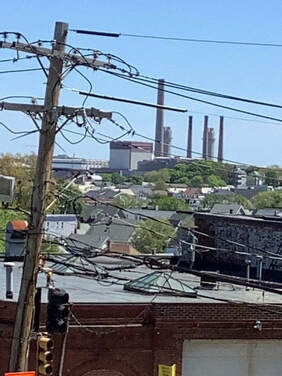 Smokestacks of the Mystic Generating Station
Smokestacks of the Mystic Generating Station The Eversource crew is still digging up the street in front of our house, laying new pipes for natural gas, and I can't help wondering where our gas comes from. The earth, yes, but more precisely where does the fossil fuel flowing to our furnace originate on a map and how does it get from there to here? So I did some research online and learned a few things about the complicated regulatory and economic superstructure undergirding said energy supply. When I related this information to my smart and sometimes patient wife -- interrupting her loving examination of the daffodils against the back fence, their yellow-smudged faces smiling -- her eyes glazed over and her smile grew as frozen as an ice-cave stalagmite. Perhaps I shouldn't have led with an explanation of FERC (the Federal Energy Regulatory Commission).
It's kinda boring, the nitty-gritty of the energy business. Not to mention opaque, complicated and jargon-laden. Within this fog, however, hides a great deal of corruption, negligence and greed. (Wall Street is much the same, its machinations almost beyond fathoming. Even the Masters of the Universe aren't exactly sure how they're screwing the rest of us.) So maybe I can cut the fog with an epic-poetic tone, something like, "Read on my children and behold what lurks/Within the midnight consolidation approved by FERC." Or maybe a more literary start, ala Gabriel Garcia Marquez: "Many years later, as he kayaked down his street flooded by the melting of Greenland, Colonel Harold Francis LaCroix III was to remember that distant afternoon when the Internet helped him discover FERC." Hmmm, maybe not. Instead, I'll just tease with seaweed. We'll go backward from smelly seaweed on Caribbean beaches to the pipes on my street.
It's kinda boring, the nitty-gritty of the energy business. Not to mention opaque, complicated and jargon-laden. Within this fog, however, hides a great deal of corruption, negligence and greed. (Wall Street is much the same, its machinations almost beyond fathoming. Even the Masters of the Universe aren't exactly sure how they're screwing the rest of us.) So maybe I can cut the fog with an epic-poetic tone, something like, "Read on my children and behold what lurks/Within the midnight consolidation approved by FERC." Or maybe a more literary start, ala Gabriel Garcia Marquez: "Many years later, as he kayaked down his street flooded by the melting of Greenland, Colonel Harold Francis LaCroix III was to remember that distant afternoon when the Internet helped him discover FERC." Hmmm, maybe not. Instead, I'll just tease with seaweed. We'll go backward from smelly seaweed on Caribbean beaches to the pipes on my street.
 Sargassum seaweed on the coast of Tobago
Sargassum seaweed on the coast of Tobago In recent decades, Sargassum seaweed has increasingly marred the once-pristine beaches of the Mexican Caribbean. There are numerous reasons for the seaweed's proliferation in this region, chief among them extreme winds and higher ocean temperatures caused by climate change. Websites such as this one help the wealthy locate beaches untrammeled by the noxious interloper. Oh, the poor dears, such a bother! I almost don't want to add that their unstainable overconsumption greatly contributes to the changing climate producing the odiferous brown mats of macroalgae that foul up their hyper-expensive, luxury-hut experiences. In fact, the rich and their irresponsible behavior are one of the biggest problems when it comes to climate change, but that's another blog for another time.
Some of the worst outbreaks of Sargassum seaweed now strangle elite enclaves such as Antigua and Barbuda, as well as upper-middle class vacation spots on Tabago. As in Trinidad and Tobago, a small nation that hosts tourists, the world's largest population of nesting leatherback turtles, and gargantuan tankers toting liquified national gas out of Port Fortin on the southwest corner of the island of Trinidad, a stone's throw by a mountain troll from Venezuela. For about 25 years, 3-4 billion cubic feet of natural gas have been extracted daily from the offshore Cannonball field and then liquified at the massive facility in Port Fortin, run by a conglomerate called Atlantic LNG. That entity is owned mostly by BP and Shell, with smaller shares held by T/T's state-controlled gas company and a Chinese sovereign wealth fund. Atlantic LNG employs 500 people, plus 1,000 contractors from around the world.
Some LNG gas tankers leave the island for Europe or Asia, but many cruise north to Boston. For reasons that I haven't discovered yet, Boston is the only U.S. city that primarily relies on imported natural gas rather than on the glut of cheap gas found in the fracking fields of Texas, Pennsylvania and other states. I'm sure it's a totally innocent reason without a hint of impropriety. At any rate, the tankers out of Trinidad and Tabago barge into Boston Harbor and unload their booty at the Marine Terminal in Everett. From here, natural gas is piped to homes, such as mine, and to the Mystic Generating Station next door. There it's burnt, the emissions are sent up smokestacks, and electricity results. The terminal and the power plant are both owned by an energy conglomerate, Exelon.
Some of the worst outbreaks of Sargassum seaweed now strangle elite enclaves such as Antigua and Barbuda, as well as upper-middle class vacation spots on Tabago. As in Trinidad and Tobago, a small nation that hosts tourists, the world's largest population of nesting leatherback turtles, and gargantuan tankers toting liquified national gas out of Port Fortin on the southwest corner of the island of Trinidad, a stone's throw by a mountain troll from Venezuela. For about 25 years, 3-4 billion cubic feet of natural gas have been extracted daily from the offshore Cannonball field and then liquified at the massive facility in Port Fortin, run by a conglomerate called Atlantic LNG. That entity is owned mostly by BP and Shell, with smaller shares held by T/T's state-controlled gas company and a Chinese sovereign wealth fund. Atlantic LNG employs 500 people, plus 1,000 contractors from around the world.
Some LNG gas tankers leave the island for Europe or Asia, but many cruise north to Boston. For reasons that I haven't discovered yet, Boston is the only U.S. city that primarily relies on imported natural gas rather than on the glut of cheap gas found in the fracking fields of Texas, Pennsylvania and other states. I'm sure it's a totally innocent reason without a hint of impropriety. At any rate, the tankers out of Trinidad and Tabago barge into Boston Harbor and unload their booty at the Marine Terminal in Everett. From here, natural gas is piped to homes, such as mine, and to the Mystic Generating Station next door. There it's burnt, the emissions are sent up smokestacks, and electricity results. The terminal and the power plant are both owned by an energy conglomerate, Exelon.
 Exelon CEO Chris Crane
Exelon CEO Chris Crane In case you're wondering, the CEO of Exelon does not live in Everett, a low-income town (45 percent Hispanic and African American) with terrible air quality largely due to the job-providing, climate-destroying energy facilities within its boundaries. It turns out that Exelon CEO Chris Crane studied at New Hampshire Technical College just north of here, but then, alas, ruined it by getting some kind of advanced executive degree at Harvard Business School. My wife says that he looks like Jenifer Garner's father in the TV show Alias. Nice pink tie, Chris. Mr. Sensitive, ready to opine about Exelon's commitment to environmental justice.
Okay, enough snark. Here comes the "interesting" part. The Mystic Generating Station is in the process of closing down. At the end of May, 2021, two of the plant's four generating units will cease operation. One of these is a highly polluting petroleum-fueled "peaking unit" used during periods of high demand. The remaining two units are slated to shutter by May 31, 2024. A few years ago, actually, Exelon viewed the entire Mystic facility as a losing venture and wanted it fully closed by 2021. Not so fast, replied IS-New England, the regional power transmission organization. First we have to choose a proposal that will replace the electricity that goes missing with your closure. The winning proposal, and cheapest, was the $49 million "Ready Path" plan from National Grid and Eversource, designed to improve the efficiency of substations and transmissions lines. This development annoyed Exelon, who now wanted to keep the entire plant open and have taxpayers subsidize the operation, so they issued a complaint to FERC. And last summer good old FERC said nix to Exelon. No backsies, you're done.
Okay, enough snark. Here comes the "interesting" part. The Mystic Generating Station is in the process of closing down. At the end of May, 2021, two of the plant's four generating units will cease operation. One of these is a highly polluting petroleum-fueled "peaking unit" used during periods of high demand. The remaining two units are slated to shutter by May 31, 2024. A few years ago, actually, Exelon viewed the entire Mystic facility as a losing venture and wanted it fully closed by 2021. Not so fast, replied IS-New England, the regional power transmission organization. First we have to choose a proposal that will replace the electricity that goes missing with your closure. The winning proposal, and cheapest, was the $49 million "Ready Path" plan from National Grid and Eversource, designed to improve the efficiency of substations and transmissions lines. This development annoyed Exelon, who now wanted to keep the entire plant open and have taxpayers subsidize the operation, so they issued a complaint to FERC. And last summer good old FERC said nix to Exelon. No backsies, you're done.
 The one and only
The one and only Was that so awful? Eye-glazing? Anyway, it's a semi-happy ending. Soon, but not soon enough, the belching power plant will go quiet and the toxic air in Everett and beyond will become a little cleaner. Greenhouse gases will stop rising from the Mystic site. The fate of the Marine Terminal is unclear, but in the meantime LNG tankers will continue to travel from Trinidad to Boston, filling our pipes, warming our homes in winter. Also, world temperatures will keep rising, Greenland will keep melting, and rich folk will forever troll for beaches without seaweed. What really sticks in my craw, however, is that bit about the electricity from the Mystic Generating Station being replaced with an upgrade to substations and transmission lines. Great, but why the hell didn't National Grid and Eversource do that years ago, rather than burning more fossil fuels? Why did it take this confusing, time-consuming process with ISO-NE and FERC?
The answer is obvious. Ultimately, fossil-fuel burners burn fossil fuels for profit. That's what they do. Until, that is, we as in WE THE PEOPLE make it too expensive or ban it outright.
The answer is obvious. Ultimately, fossil-fuel burners burn fossil fuels for profit. That's what they do. Until, that is, we as in WE THE PEOPLE make it too expensive or ban it outright.
 RSS Feed
RSS Feed